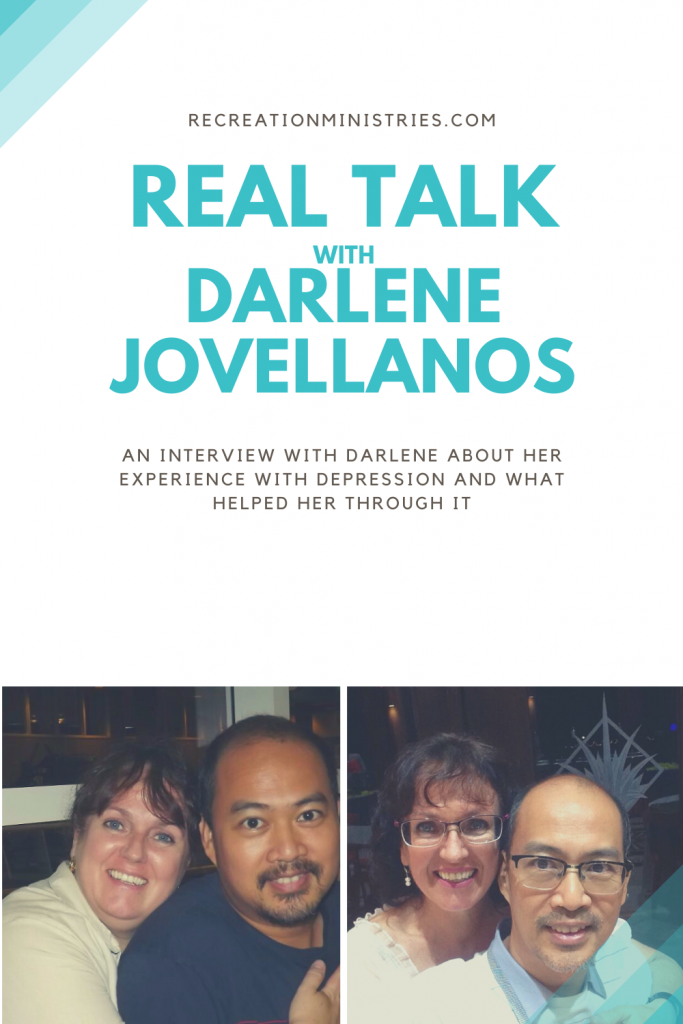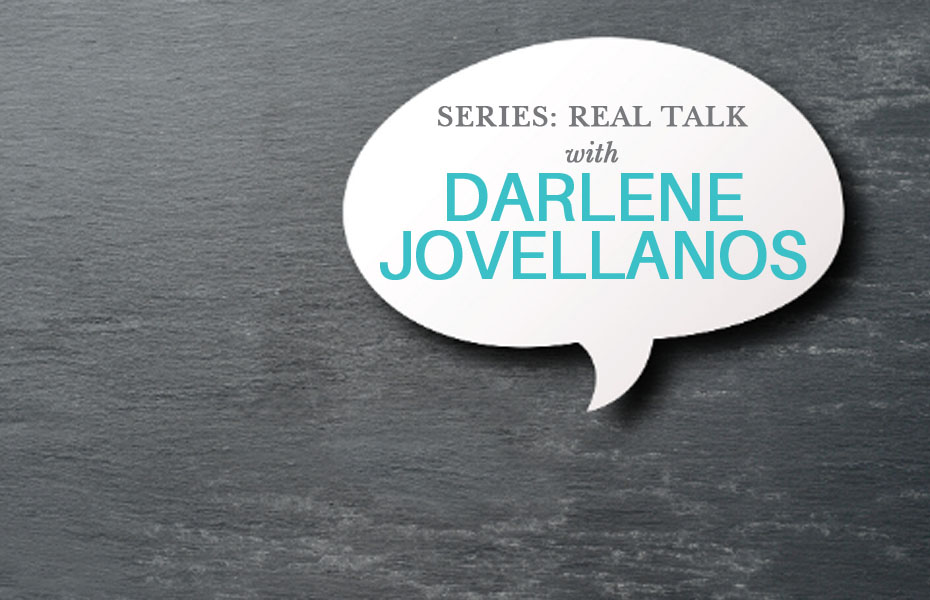New Interview Series on Dealing with Mental Illness
Hello friends. I’m here with another interview series I’m calling Real Talk. This series will allow me to share with you all other people’s stories and experience with mental illness, such as depression, postpartum depression, anxiety, etc. A very important part of breaking the stigma of mental illness is raising awareness. Allowing the space to have conversations around the issue; where people feel safe to discuss questions, stories, and experiences with others.
Meet Darlene
Today’s Real Talk Interview is with a friend and mentor of mine – Darlene Jovellanos. Let me give you a little background. Darlene grew up on a farm in Western Canada, the youngest of 7 children. Her parents and most of her older siblings are strong believers. I met Darlene at my dad’s church back in Michigan, many years ago. She was one that I looked up to for many reasons. I was also very impressed with how well her Tagalog and knowledge of the Filipino culture was. Let’s just say it was better than mine and I’m Filipino.
Another reason I considered Darlene as a mentor figure was through our shared experience being in the mission field. After my exprience in West Africa, she was one of the ones who took time to talk to me. She was intentional about really seeing how I was doing and adjusting to life back in the states. Darlene wanted to know more than “did I see any Lions?” She also spent a significant time as a missionary to the Philippines and could relate to me in ways others couldn’t.
Current Ministry
Currently Darlene, her Filipino husband, and their two kids (15 and 16 years old) reside in the Philippines. There her family trains Christians to use TESOL (Teaching English to Speakers of Other Languages). They use English classes as a platform of ministry to speakers of other languages throughout the world.
When I shared for the first time about my own experience with mental illness, Darlene was one of the first to lend her support. She also shared with me that she too had struggled with depression. It was somewhat comforting and encouraging to know that someone understood and could relate. Not only that, she was also someone in the faith, and someone I’d look up. To hear her own struggle was a blessing to know that there is hope and healing.
So when she agreed to share her story for this blog, I was more than thrilled to do this interview.

Right Picture: Current photo or Darlene and her husband (2019)
RCM: When/ how long have you been aware of your depression?
DJ: I experienced postpartum depression after my second child was born. That turned into about 7 years of depression (basically 2005-2011). I was never diagnosed as clinically depressed, but my doctor did put me on antidepressants for part of that time. Since 2012, I have had very short periods of depression, but I think within very normal experience. When I talk about my experience of depression, I definitely consider it a thing in the past.
RCM: What did a good day with depression look like?
DJ: I was able to carry on life pretty much normally. But had a deep sense of sadness most of the time. It made no sense to me — my circumstances didn’t warrant that kind of sadness. I had a wonderful, supportive husband, and 2 very precious and easy-to-manage children. So I guess the other things I carried along with the sadness was a deep sense of guilt for feeling the way I was feeling. The sadness and guilt combined drained me of energy. It was very hard to motivate myself to do anything beyond filling my role as a wife and mother.
RCM: What was a hard day like?
DJ: The hard days would have me in tears. Very often I would have chats with my husband (through those tears). [We would talk] about how my situation seemed “hopeless” and “helpless”. I think those 2 words best describe the entirety of my experience with depression.
RCM: As someone in ministry how did you handle realizing you were struggling with depression?
DJ: I wasn’t specifically in ministry during those years of depression. I was Director of our church’s VBS program during those years. And I just wished I didn’t have to do it. It was a heavy burden on me every year. I don’t think I ever truly enjoyed doing it, but did it heavily and out of a sense of duty.
RCM: How did others handle learning of your illness
DJ: I’m not sure how many people knew. My husband did. I’m guessing most of my friends probably didn’t realize it was such a heavy thing for me. My Mom and some of my siblings knew because I told them. I don’t think I was ashamed of what I was feeling. But I didn’t think people would realize how heavy it was for me. And most definitely wouldn’t understand how I could possibly be depressed when circumstances in my life didn’t warrant it.
RCM: Where did you find the most support?
DJ: My husband. He didn’t try to fix me. Just listened, comforted, prayed, tried to help me see that ultimately God was in control and could handle my depression.
RCM: In which area would you like to see more improvement regarding mental illness?
DJ: It would be helpful if people didn’t see depression as just a spiritual matter, that people should NOT experience if they are genuinely walking with God.
DJ: I think that is still sort of the prevailing notion through much of the Philippine Christian community. I am thankful to be able to share my experience with people, and to help be a small part of correcting that skewed perspective.
Additional Resources
DJ: Let me add. What do I think helped the most in coming out of my depression? Honestly — change of eating habits. I was diagnosed with diabetes in late 2011 and radically changed my eating habits at that time. Eating whole foods — radically increased intake of fruits and vegetables, and avoidance of processed foods. Within a couple of weeks of starting to eat that way, I remember being surprised at how bright life looked after so many years of sadness.
I distinctly remember mentioning this to my husband — “Maybe I’ve just been malnourished all these years!” That may not, by any means, be the answer for everyone who is struggling with depression. I imagine that there are some who could find their way out of depression by embracing an eating lifestyle high in natural foods, low in sugar and low in processed foods. At least it is worth a try!! The book that initially got me on the road to whole-food (highly plant-based) eating was Joel Fuhrman’s “Eat to Live”. In the past year, eliminating sugar and flour from my diet after reading Susan Peirce Thompson’s “Bright Line Eating” book has helped immensely too.
RCM: Thank you again for your willingness to share your experience. What I’m learning about depression is that symptoms and experiences can be different for everyone. That is why it is so important to share our stories. So we can be better informed, and better prepared to help. It is awareness that will help break the stigma around mental illness. And like you said be“a part of correcting that skewed perspective.”



thanks for sharing my story, Reaiah 🙂
No, thank you. I am honored that you entrust me to tell your story. It’s a story worth telling and will help many.
Comments are closed.